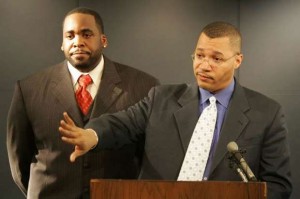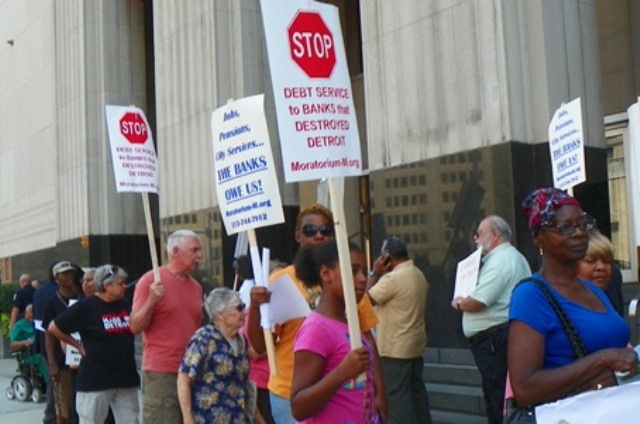By Wallace Turbeville, Senior Fellow at Demos
January 17, 2014
Just three days before Kevyn Orr, the Emergency Manger appointed by Michigan Governor Snyder to run the fiscally strapped City, filed the largest municipal bankruptcy case in history, he signed a Forbearance Agreement with UBS and Bank of America/Merrill Lynch establishing a process to settle possible claims on default of $800 million of interest rate swaps.
The potential claim would be very large, then estimated in the range of $350-400 million. Even worse for the City, the banks had inserted a provision in the swaps allowing them to grab all of Detroit’s tax revenue from casinos, 20% of its total revenue, until they were paid in full, a cash drain that would be a serious matter. The Emergency Manager used this to justify the rush to a settlement so generous to the banks, even as he was prioritizing draconian cuts to City worker pensions.
Under the agreement, the claim would be reduced by 20-25% and the banks would forbear from terminating the swaps and claiming the revenues, but only if Detroit could pay off the banks within one year. The agreement had two other main terms: it had to be approved by the court in the imminent bankruptcy; and the City agreed not to challenge the validity of the swaps or the claim to gaming tax revenues in any court proceeding.
The Emergency Manager then negotiated a deal with Barclay’s to pay off the swap banks, granting Barclay’s a security interest in the gaming tax and other revenues. Unlike the claim under the swaps, the Barclay’s loan would be payable over time. Financing in hand, the Emergency Manager petitioned the bankruptcy court for approval of the whole package.

- Former Mayor Kwame Kilpatrick and his CFO Sean Werdlow, who negotiated the COPS deal and then got a top management job with one of the lenders.
The validity of the swaps was no trivial matter under Michigan law. Neither was the validity of the claim to the gaming tax revenues. To an experienced municipal finance professional, these deals just looked wrong. Moreover, it remained a mystery why Detroit did the swaps in the first place. Simpler, less risky financing alternatives were available. This was especially troubling since the deals were put together in the administration of Mayor Kwame Kilpatrick, currently serving a 28-year sentence for misdeeds while he was in office.
In a special report, Demos identified these issues and urged the bankruptcy court to reject the swaps settlement agreement and force either the resolution of validity issues or the negotiation of a much smaller amount. In a hearing just before Christmas, Judge Steven Rhodes ruled that the Emergency Manager had not demonstrated that the large settlement amount had been justified. He designated a separate judicial mediator to try and get a reasonable deal. Before the New Year, a new deal was presented, increasing the “haircut” of the claim to a flat 33% from the floating 20-25%.
On Thursday, Judge Rhodes ruled that this new deal did not come close to being good enough. He found that the claims of invalidity are “reasonably likely to succeed.” If they did succeed, the banks would recover little or nothing on their claim. Moreover, if the swaps were void at inception, the City might be able to recover eight years of payments on the swaps, hundreds of millions of dollars. All of this would reduce the need to cut public employee pensions to pay for basic services and improvement of the City’s economy.
The Emergency Manager now has two choices. He could pursue resolution of the validity issues in court. Judge Rhodes promised prompt resolution of issues presented to him. Alternatively, he could bring the banks back in to negotiate a far lower settlement number that Rhodes would deem fair, eliminating the litigation risk.
The judge’s ruling deepens a lingering mystery surrounding the deal with the swaps banks: why did the Emergency Manager rush through a settlement that even the bankruptcy court found to be fundamentally out of balance while simultaneously pounding away at the public employee pensions? Perhaps he was genuinely panicked by the prospect of losing all of the gaming tax revenues until the banks were paid back. Perhaps he is just ideologically predisposed to prefer obligations to banks as being more sacred than obligations to pensioners. But there are some other possibilities:
 He may have seen his mission to include damaging the public employee unions forever by fundamentally altering the retirement system. He could have concluded that, the direr were the City’s fiscal circumstances, the easier it would be to justify draconian cuts to the benefits of retirees.
He may have seen his mission to include damaging the public employee unions forever by fundamentally altering the retirement system. He could have concluded that, the direr were the City’s fiscal circumstances, the easier it would be to justify draconian cuts to the benefits of retirees.
He might also have been predisposed to avoid challenges to the validity of municipal swaps. Orr was a partner a Jones Day before his appointment and that firm was hired to represent the City (meaning the Emergency Manager) in the bankruptcy. Jones Day is a huge law firm with a large municipal finance practice. It has rendered hundreds of validity opinions in municipal swaps and bond deals. Such a law firm would hardly welcome any finding that a municipality’s financial obligations were invalid.
We will probably never know if any or all of these motivations were at work. But it is clear that the continuing fights over pension obligations of cities and states should be seen in the context of ideology, partisan politics, and the sheer power of the financial sector.








